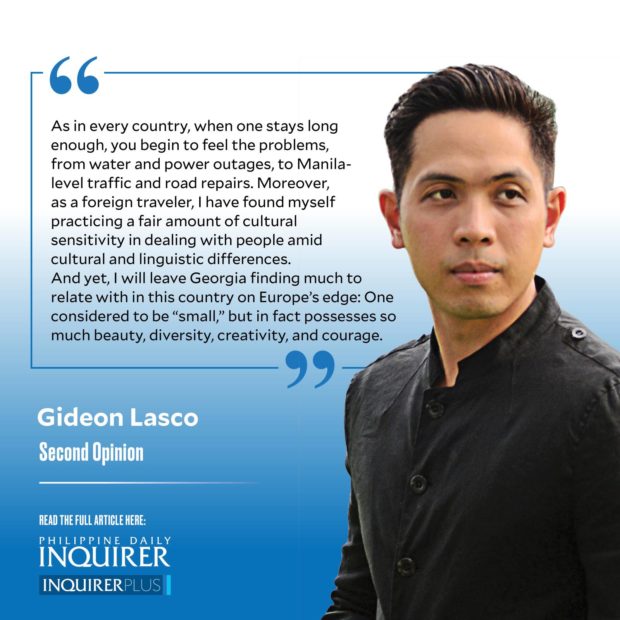Georgia, on Europe’s edge

Tbilisi, Georgia—To say that this city is unmistakably “European” is to question the very idea of what “Europe” is.
At a superficial level, perhaps it’s the city’s overall atmosphere, with the Mtkvari river meandering around the city the way the Seine snakes through Paris, passing through Art Nouveau neighborhoods, Byzantine churches, neoclassical monuments, and modernist Soviet structures. Under the shadow of the literal grapevines that add to the city’s charm, travelers wearing flip-flops and large backpacks walk alongside fashionable locals and those simply carrying on with their everyday lives.
And yet, there are also clear Asian influences in the capital of a country that shares borders with Turkey, Armenia, and Azerbaijan; one that is becoming a popular tourist destination for people living in Western Asia—including our kababayans there. There are Indian, Pakistani, Yemeni, Iraqi, and Thai restaurants, as well as Chinese infrastructure projects.
The actual boundaries of Europe and Asia have always been a matter of convention and contention. If, as many geographers believe, the Caucasus serves as the boundary between the two continents, then much of Georgia would be considered part of Asia.
Historically speaking, however, Georgia—with its proud heritage as being an ancient (and early Christian) state—has always maintained a kind of Western orientation, notwithstanding centuries of Mongol, Ottoman, Persian, and Russian suzerainty. Indeed, its public memory is dominated not by Ottoman sultans or Romanov tsars, but by icons of the country’s medieval Golden Age, like King Tamar and the poet Shota Rustaveli.
In any case, most Georgians feel that they belong to Europe, not just geographically but politically, which is likely why the European Union flag often stands alongside the Georgian one in public buildings. To be sure, I have heard contrary opinions: for instance, that Europe’s liberal values are incompatible with Georgia being a “conservative country” (Tellingly, a Pride March was violently disrupted by far-right protesters last year, signaling tensions within an increasingly polarized society). However, as far as Europe is concerned, the majority sentiment is clear, with one recent survey indicating 83 percent support for their country’s joining the EU in the wake of the Ukraine war.
This brings me to the one geopolitical issue that’s felt in Georgia perhaps more than in most other parts of the world: Putin’s war on Ukraine. Indeed, even more prominent than the white and red of the Georgian flag are the yellow and blue of the Ukrainian one, not just in flagpoles but in LED screens, restaurants, T-shirts. While Russia remains one of the country’s leading trading partners and the cultural ties between the two former Soviet countries are inescapable, there is lingering resentment over the two Russia-backed republics within its territory—South Ossetia and Abkhazia.
Such tensions notwithstanding, Tbilisi is attracting people from around the world as a hub for digital nomads, and economic observers are upbeat about its future prospects.
Even after just a few days, its allure is clear: Fast internet. Affordable cost of living. Generous visa policies (Philippine passport holders can easily apply for an e-visa, and those who hold multiple-entry US or Schengen visas can enter visa-free).
The food is actually quite compatible with Filipino palates; beyond the khachapuri (cheese bread) and khinkali (meat dumplings), there’s the tinola-like chakapuli and the kaldereta-like ostri. The wines, of course, are incredible in their supposed birthplace—and I now count Saperavi and Aleksandrouli among my favorite reds. Georgians do not just treat wine like water, they also treat water like wine, and I have come to appreciate the distinctive taste of the much-loved Borjomi mineral water.
Nature is a big part of the appeal that drew 1.8 million tourists to Georgia last year, and as the highlight of my trip, I went to Kazbegi and did a four-day climb up the pyramidal, 5,033-meter peak of Mt. Kazbek: located at the very border between Georgia and Russia, but very much central to the former’s cultural imaginary. Delightfully, some of the paintings I saw in Tbilisi’s museums depict Kazbek and the iconic Gergeti Church.
As in every country, when one stays long enough, you begin to feel the problems, from water and power outages, to Manila-level traffic and road repairs. Moreover, as a foreign traveler, I have found myself practicing a fair amount of cultural sensitivity in dealing with people amid cultural and linguistic differences.
And yet, I will leave Georgia finding much to relate with in this country on Europe’s edge: One considered to be “small,” but in fact possesses so much beauty, diversity, creativity, and courage.
—————-
glasco@inquirer.com.ph




















